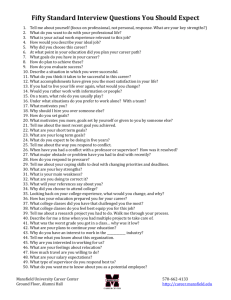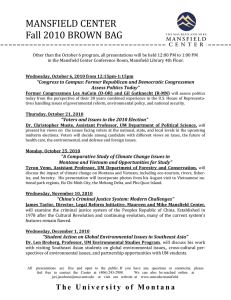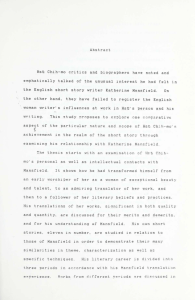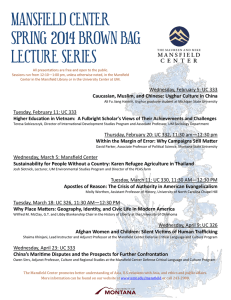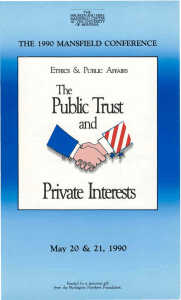Political Déjà Vu?
advertisement
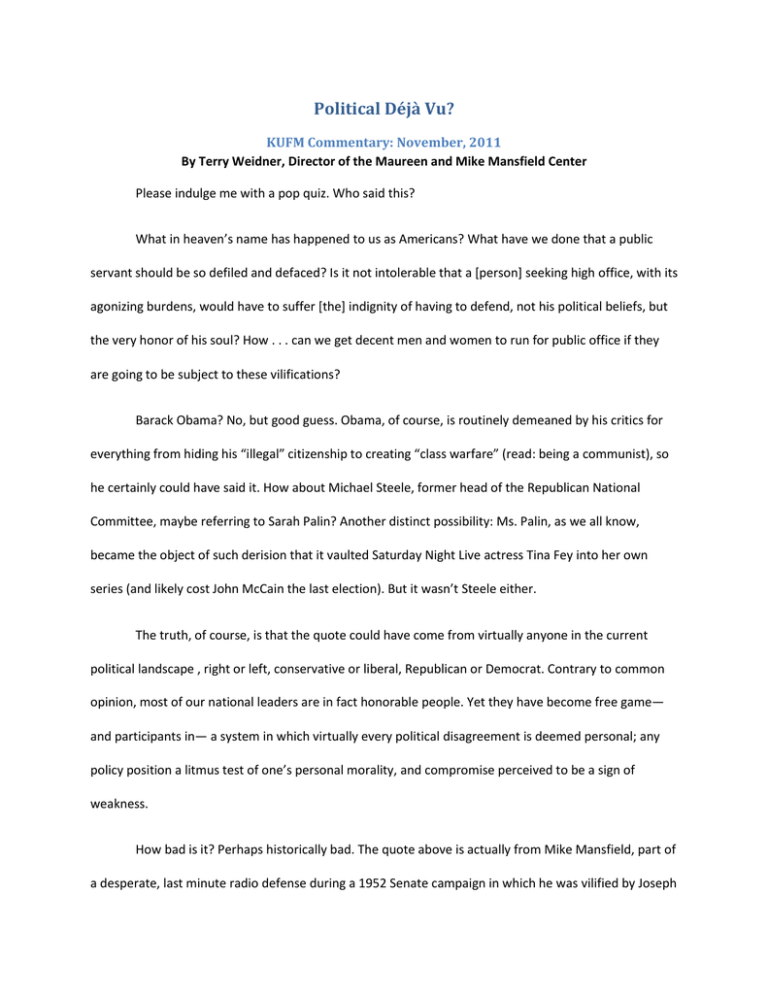
Political Déjà Vu? KUFM Commentary: November, 2011 By Terry Weidner, Director of the Maureen and Mike Mansfield Center Please indulge me with a pop quiz. Who said this? What in heaven’s name has happened to us as !mericans? What have we done that a public servant should be so defiled and defaced? Is it not intolerable that a [person] seeking high office, with its agonizing burdens, would have to suffer [the] indignity of having to defend, not his political beliefs, but the very honor of his soul? How . . . can we get decent men and women to run for public office if they are going to be subject to these vilifications? Barack Obama? No, but good guess. Obama, of course, is routinely demeaned by his critics for everything from hiding his “illegal” citizenship to creating “class warfare” (read: being a communist), so he certainly could have said it. How about Michael Steele, former head of the Republican National Committee, maybe referring to Sarah Palin? Another distinct possibility: Ms. Palin, as we all know, became the object of such derision that it vaulted Saturday Night Live actress Tina Fey into her own series (and likely cost John Mcain the last election); ut it wasn’t Steele either. The truth, of course, is that the quote could have come from virtually anyone in the current political landscape , right or left, conservative or liberal, Republican or Democrat. Contrary to common opinion, most of our national leaders are in fact honorable people. Yet they have become free game— and participants in— a system in which virtually every political disagreement is deemed personal; any policy position a litmus test of one’s personal morality, and compromise perceived to be a sign of weakness. How bad is it? Perhaps historically bad. The quote above is actually from Mike Mansfield, part of a desperate, last minute radio defense during a 1952 Senate campaign in which he was vilified by Joseph McCarthy and company. As part of that campaign, a circular was sent by mail to Montana households trumpeting “Mansfield !ided ommunist line WHIH LED TO KORE!N W!R;” Thousands of households also received anonymous phone calls whispering “Mike Mansfield is a communist;” You get the picture; Nothing of which to be proud. With his election chances looking grim, many urged Mansfield respond in kind, but he refused, opting instead for the call for political sanity quoted above. Ultimately, Mansfield won the election by only two-tenths of one percentage point, in so doing launching a career in which he became one of !merica’s most revered and respected leaders; ut could he have won running a principled campaign today? Could he have survived in the Senate with an approach that focused on collegial respect and, not just compromising , but actually crediting opponents for landmark legislation, as he did for the Civil Rights !ct of 1964? I don’t think so; That gives us more to ponder: very few Americans under 30 even know about the kind of political decency Mansfield personified. They perceive our current system as “normal;” There are several possible explanations for our current political problems. Gerrymandering by both parties has divided the nation into hundreds of “safe” constituencies in which candidates often don’t have to compromise to win elections. Moreover, the politicization of media has virtually eliminated objective national news (save for public radio and television) in favor of “info-tainment” or, worse, distinct versions of the news, in which there is one simple truth unchallenged by opposing viewpoints or complexities. All this has resulted in the political equivalent of a bad reality show. Placing blame has become more important than getting something done, and politicians of all stripes try to numb us into thinking that in government, unlike real life, there really are simple solutions to complex problems, and that anyone who isn’t a friend is an enemy; The Occupy Movement, whatever one thinks of it, seems to reflect our growing disgust with government. But until we demand a return to civility, honor, and the need for compromise and sacrifice—in short, the kind of government Mike Mansfield represented—can we expect much to change? Terry Weidner is Director of the Maureen and Mike Mansfield Center at The University of Montana. The opinions expressed are his own.

